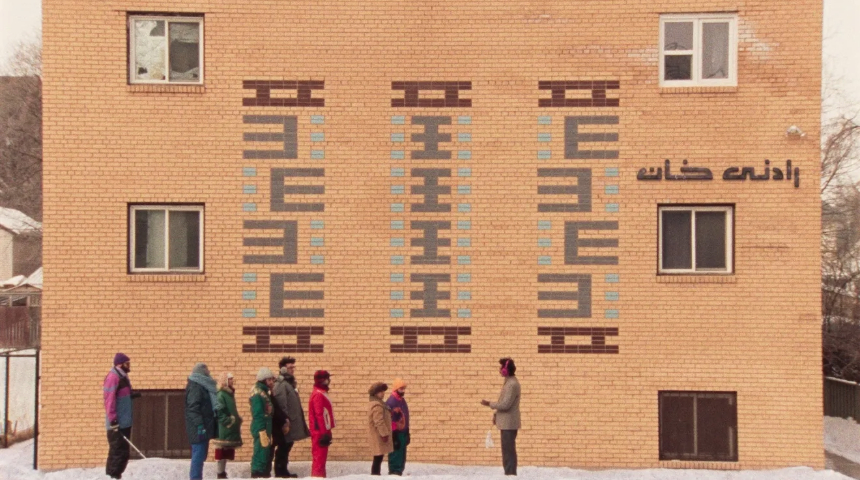Cannes 2024 Review: UNIVERSAL LANGUAGE, A Triumph for Canadian Cinema
Canadian filmmaker Matthew Rankin directs and stars in his new Winnipeg-set, Farsi-language comedy feature.

Immigration is a hot-button issue in several Western countries as they reconcile the ways in which it is transforming their national identity. Even in the United States, it remains an active tug-of-war. But in Canada, it is a fait accompli, a settled matter, as Canada has largely embraced its destiny as a nation of people from all over the world.
Matthew Rankin, in his magnificent new film Universal Language, offers a beautiful paean to Canada’s unyielding embrace of multiculturalism. It would almost be poignant if it weren’t so damn funny.
Univeral Language is an absurdist comedy that is not just a great Winnipeg film, but a great Canadian film. It is a film made by Canadians, for Canadians and extolls Canadian values. In a nod to the country’s diverse make-up, it is performed entirely in Farsi and French with a superb ensemble cast including numerous Iranian-Canadian actors. The tone veers somewhere between Wes Anderson and Jacques Tati. And the humor derives organically from national impulses, like Quebec not giving a fuck about the rest of the Country.
Universal Language takes place in an imagined reality where Winnipeg is entirely Farsi-speaking. All the signage in the city is in the Arabic alphabet and shops and street vendors sell Iranian wares. The screenplay weaves in a large cast of eccentric characters having quotidien adventures as they go about a regular day in their lives.
There’s the kid who loses his glasses (Sobhan Javadi), two sisters who find a 500 Iranian Riel note frozen in the ice (Rojina Esmaeili and Saba Vahedyousefi) and their classmate who dresses up like Groucho Marx (Parsa Sattari Ghahfarokhi). There’s also their beleaguered teacher (Mani Soleymanlou), the local Winnipeg tour guide (Pirouz Nemati), the lacrimologist who collects tears (Sahar Mofidi) -- this is a made-up job no such job exists -- and the turkey shop owners that have ordered a prize turkey from Quebec (Bahram Nabatian and Mohammad Salari). Then there’s writer-director Matthew Rankin playing a sad, depressed version of himself, and the kind man (Akram Khanalizadeh) who befriends him.
One of the greatest pleasures of Universal Language is the unexpected and often extraordinary ways in which our various characters cross paths with each other. Surprising relationships exist between them which almost function as reveals. The clever screenplay is beautifully constructed as all the events take place in a tight 36-hour time span. Rankin achieves unity of time and place by packing all his characters in a small Winnipeg neighborhood so that they all keep bumping into each other in fascinating encounters.
For a small film with modest resources, Universal Language also boasts terrific mis-en-scene. The wide and medium shots, often with symmetrical framing and elaborate art direction, strongly recall Wes Anderson’s persnickety blocking. An early scene sees a shot reverse sequence repeatedly break the 180-degree rule with identical positioning of objects within the frame to further disorient the viewers. A 360-degree panning shot at a traffic island has multiple lines of actions happening in the frame at different distances from the camera.
Rankin also uses the brutalist architecture of Winnipeg to create imposing geometric tableaus for his characters to wander through. Universal Language’s sophisticated visual grammar elevates it over Hollywood comedies, which are essentially TV-level sitcoms on the big screen.
The imaginative production and costume design add to the Anderson of it all. Interiors replicate the 70s pseudo-Euro style with several standout environments, like a tissue paper repository, a bingo club for older patrons and a turkey shop with pictures of turkeys on the wall.
Audiences might be forgiven for thinking Universal Language is a period piece, as the screen is stripped bare of all modern appliances and equipment. Only a shot of the highway late in the film breaks the illusion because we finally see modern cars. The scene confirms Universal Language is set in contemporary Winnipeg, though by way of Tehran. When we inevitably visit the most Canadian institution of all, a local Tim Hortons, it too is transformed into an Iranian tea salon.
The game cast, including child and adult actors, deliver their lines in an arch, deadpan manner, like in the Nordic comedies of Roy Andersson and Aki Kaurismäki. It makes some of the bizarre things they say to each other more amusing. Other recurring gags include Quebec and Manitoba each having their own versions of cheesy TV ads, Winnipeg tourist landmarks including a bag left on a park bench, and a turkey that travels by bus.
Universal Language isn’t bereft of feeling though. A breathtaking switcheroo in the finale brings in the pathos and simply illustrates the film’s central thesis: Canadians, regardless of origin, are all alike due to their capacity for selflessness and generosity.

Do you feel this content is inappropriate or infringes upon your rights? Click here to report it, or see our DMCA policy.






